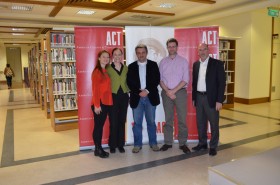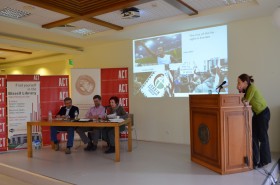
Activism isn’t just clicking ‘Like’
ACT hosts a workshop on Activism, Creative Participation and Democracy,
with a focus on anti-corruption and anti-racism.
Governments serve the public….right? Rule of law and police forces protect the public….right? But what if they don’t?
A government is more powerful that the individual, right? The notion of a ‘social contract’ is just a theoretical ideal, isn’t it?
In an age of new media, anyone can be an activist. Once a story breaks, it is not owned by anyone or under anyone’s control - not the person who wrote it, the person who features in it and certainly not the company that owns a newspaper of tv station.
The transmission of news is becoming democratized and internationalized and this is the key weapon of the citizen in the fight against corruption, unfair policies and racism. Kostas Kallergis (anti corruption blogger), Damian Mac Con Uladh (activist journalist focusing on racism) and Maggie Nolan, (of the anti-racist, anti-fascist group KEERFA) were guest speakers at ACT’s Inspiration Exchange Event ‘Activism, creative participation and democracy’ which explored issues of citizen journalism, anti-racist actions and how to challenge corruption.
With a common theme of the power of the individual and small groups of people in confronting injustice, the three speakers highlighted how the tools available to the average person (Facebook, Twitter, blogging and human interaction) can be and ARE more powerful than any country’s restrictions or attempts to limit expression.
Mr Kallergis introduced the term ‘punishment by publication’ and noted that the means of implementing this owes much to the freedom of the ‘blog-sphere’. The old media relies on advertisers and corporate input, therefore the journalists can never be entirely free, whereas the internet has the capacity to truly live up to the ideal of the press as the 4th estate; as a check on the powers of the 3 branches of government, and their interaction with business.
This role of the press as a watchdog of government and big business is something that all citizens can participate in, on a daily basis and through this, can hold politicians to the ‘social contracts’ that they enter into when they make election promises and policies.
Defining corruption as ‘any deviation from an ideal’ Mr Kallergis demonstrated that one doesn’t need sophisticated technology, expensive equipment or expertise to fight corruption, simply the will and the means to get the story out somewhere….anywhere…. and it will be picked up, circulated, magnified and will become a weapon to make voices heard.
Social media has dramatically changed the relationship between the journalist, the press company and the reader, stated Damian Mac Con Uladh, and continues to break down the distinction between the three. Twitter, smart phones, Facebook and blogs allow readers to become the creators of the news and the shift in power between who owns the means of production of the ‘news’, who defines what ‘news’ is and who reports it and how, as undergone a sea change in recent years.
Citing the horrific incident of Walid, an Egyptian immigrant in Salaminas who was tortured by his employer (a former vice-mayor), that resulted in Walid’s arrest(!), Mr Mac Con Uladh illustrated the pivotal role of the social media in getting the story out – not just nationally, but internationally- despite the ministries’ press offices denying access to the main actors and the mainstream broadcast and print press not reporting on the story at all.
The pressure via the social media explosion of interest in the story was probably key to ensuring that Walid wasn’t deported.
Accusations of torture by the police, the racist attacks on immigrants and the policies that restrict freedoms and rights that are reported on by UNHCR and Amnesty International about Greece never appear in the mainstream media, but it is citizen blogging, Tweeting and sharing, that forces the light of disclosure onto the murky corners of violations and silence.
Continuing with the theme of the rise of racism in Greece, Maggie Nolan of KEERFA, spoke about the rise in fascism in Europe in general over the past 5 years and highlighted the tragedies of migrants drowning, families being put in detention camps and the abuses of rights and freedoms of refugees seeking asylum in Greece – at the hands of both private citizens and the police.
She emphasized that while the social media plays a vital role in communication and the spreading of information and organizing of groups against racism, there is still a great need for people to meet. Large numbers of people showing solidarity, visibly, has to accompany any online activism in order to make an unambiguous statement that there are large groups of people, organized and willing to get out on the streets, go into schools and say ‘never again’!
Ms Nolan highlighted several alarming cases of the unchecked and un-opposed power of various far-right groups in taking the law into their own hands and in spreading hate and violence. She also pointed out that racism isn’t limited to groups of people organized under their own volition, but also institutionalized in the immigration policies and the government operations, such as ‘Xenios Dias’ (the police ‘scoops’ of illegal immigrants off the streets and into detention centers) the denial of permits to build places of worship or the refusal of citizenship to 2nd generation migrants who were born and have grown up in Greece.
A lively discussion followed which included issues of how to deal with racist actions of individuals, (such as a young footballer making a Nazi salute)forgiveness, how to get active and also, slightly surreally, the central role of yogurt in expressing dissent!
The struggles are ongoing and should anyone wish to follow the work of any of the guests, please find details below:
KEERFA: http://www.antiracismfascism.org/
Kostas Kallergis’ Blog: http://www.crisisrepublic.com/

